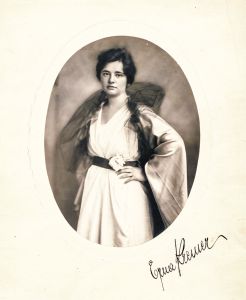Discovering a Woman Artist’s Life
On 16 October 2019, the project spiel|macht|t|raum will dedicate the hall used by the Centre for Further Education to a new source of inspiration for the 2019/20 academic year: Erna Kremer, a pianist and former instructor at our institution.
The run-up to this occasion presented as good an opportunity as any for the mdw Archive to take a look at Kremer’s biography—the story of a life that began in the multi-ethnic Habsburg Empire and met its violent end in National Socialism. Erna Kremer was educated at what is now the mdw, where she completed her training as a pianist and music teacher and also attended the “Master School” of Emil Sauer. Kremer was herself hired to teach here in 1934, but since she was the daughter of an assimilated Jewish family, Nazi Germany’s annexation of Austria in 1938 saw her immediately put on leave and ultimately let go.

Kremer then lost her apartment and was placed in group accommodations, and all of her attempts to leave the country failed. “The worry and anxiety are growing constantly and have already become entirely unbearable. […] We have only one remaining wish—to leave soon,” wrote a despairing Erna Kremer in a November 1940 letter to relatives.
On 6 May 1942, a deportation train carrying Erna Kremer, her mother, and her brother deported from Vienna: the three were taken to Maly Trostinec, where they were murdered immediately following their arrival on 11 May 1942.
Alongside the biographical information on Erna Kremer that one can glean from archival sources, her extant letters to members of her family are of particular note. A further special source consists in passages of text in the literary works of her niece Ilse Aichinger in which the environments inhabited by Erna Kremer are described. This range of sources is rounded out by reminiscences preserved by her family and passed on in interviews.
Culturally situated in a world between Judaism and Christianity, between bourgeois educational aspirations and limited financial means, and between the dreams and the realities of a career as a pianist and teacher, Erna Kremer inhabited a society that was significantly influenced by misogyny and anti-Semitism. In such circumstances, there were only few women who succeeded in prevailing over the male competition and gaining a professional foothold at the mdw.
Examining Erna Kremer’s life entails honouring her achievements and also embodies a step towards rescuing from anonymity and obscurity those woman artists who worked at the mdw and whose lives were extinguished by National Socialism.
The brochure Erna Kremer. Lemberg 1896 – Maly Trostinec 1942. Annäherung an ein Künstlerinnenleben will be published in printed form as a special edition of the Archive’s own series of publications to mark the temporary dedication of a hall to her; it will also be published as an open access document at the Archive’s web presence. Another text accompanying this hall’s dedication will be a biographical contribution on Erna Kremer written by the Archive team. This text will be placed online at the mdw’s virtual history platform: mdw.ac.at/spielmachtraum

